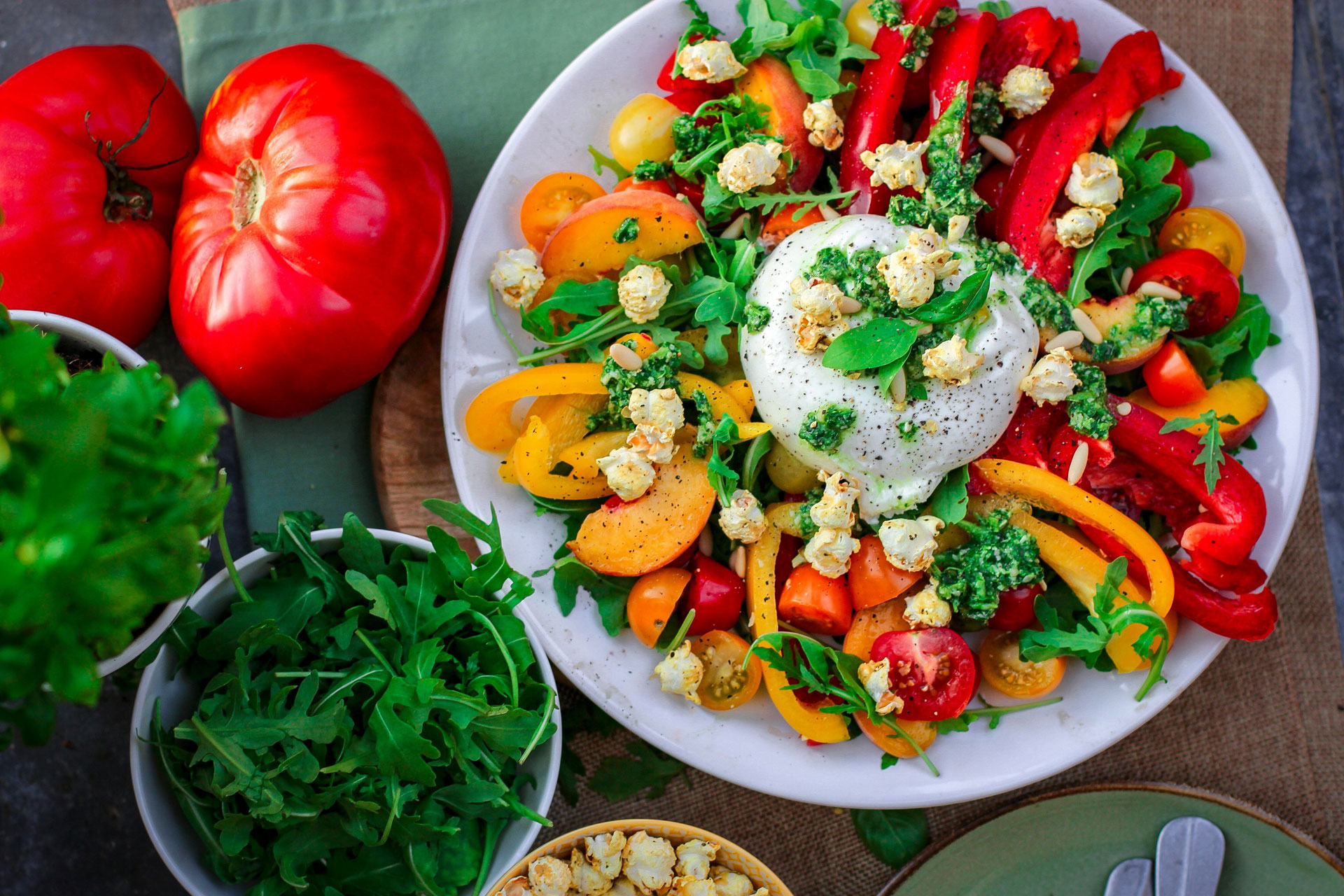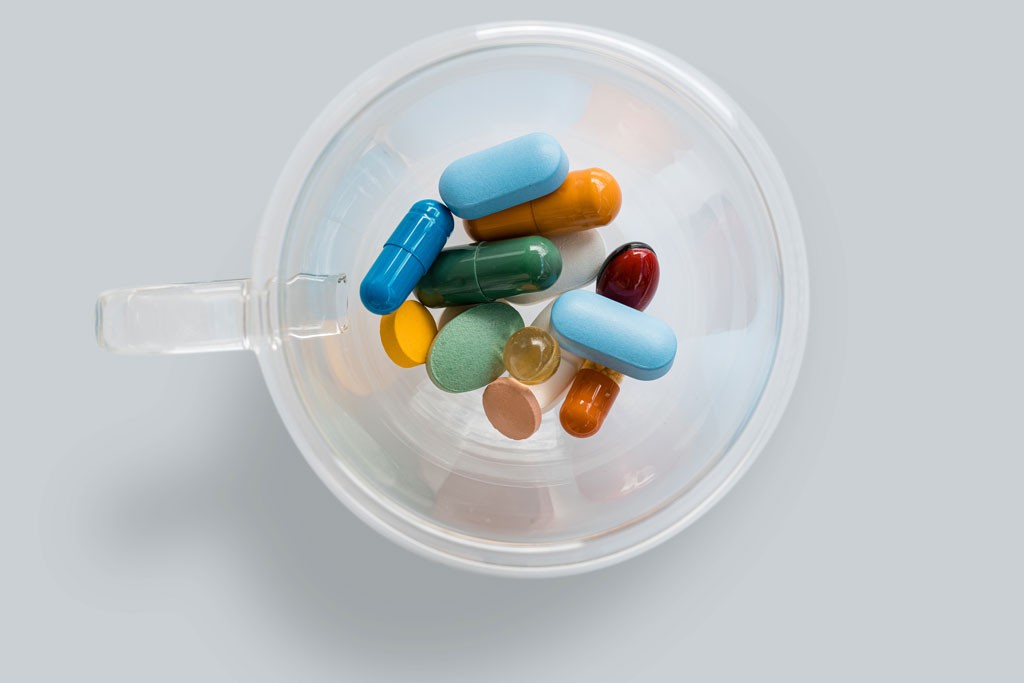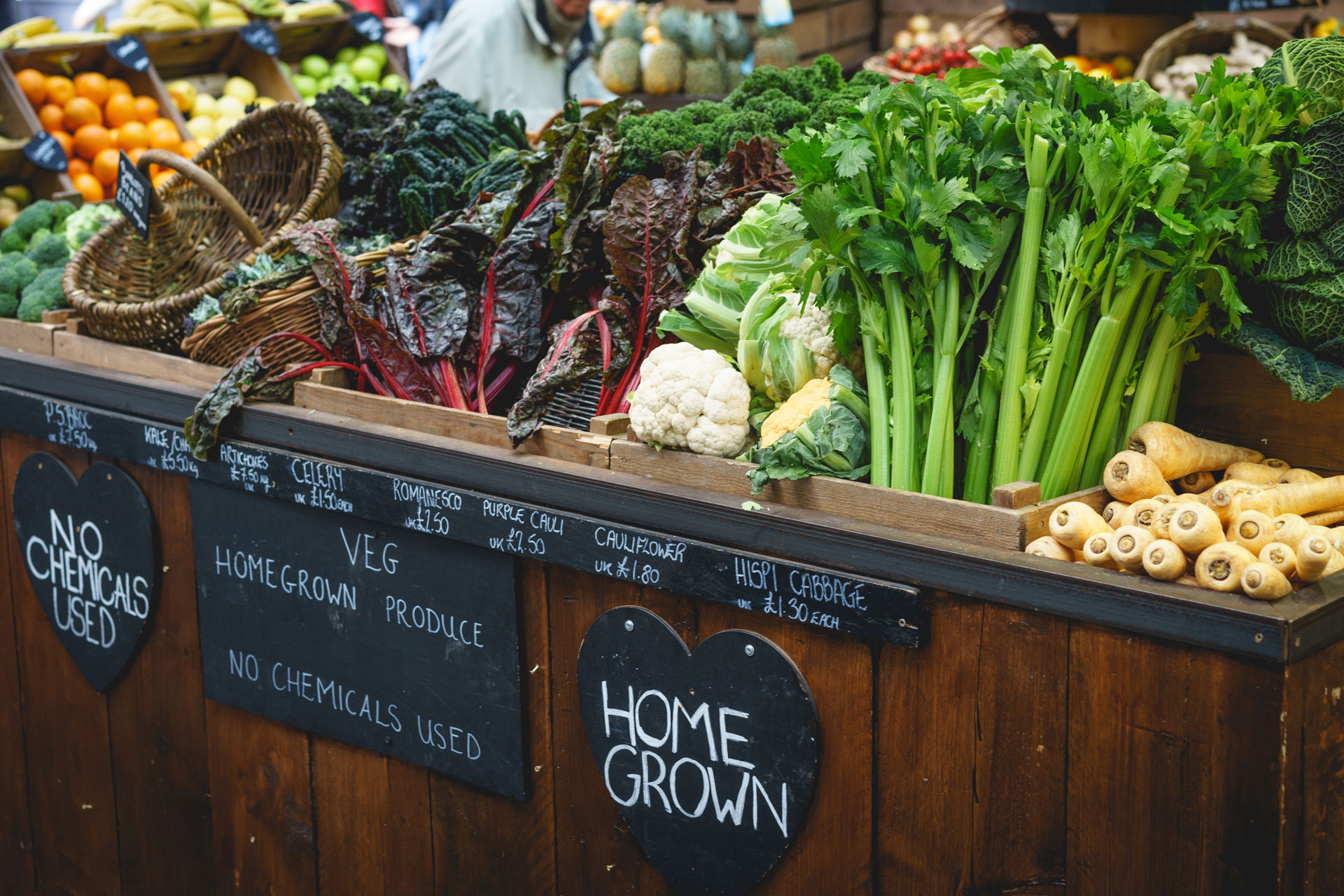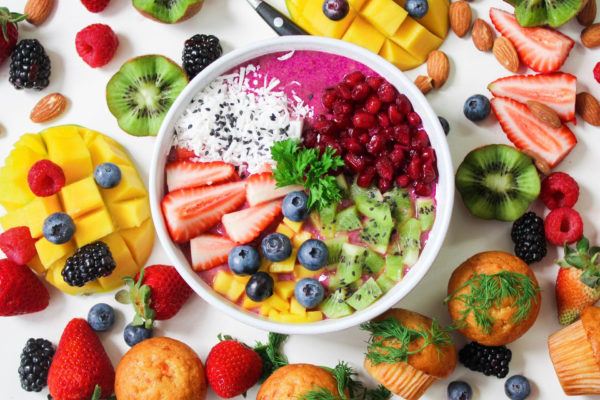Nutritionist Rhiannon Lambert On The Plant-Based Revolution
By
10 months ago
Should we all be eating plant-based?

The world of nutrition can be endlessly confusing – particularly online, where wild health crazes pop up daily on TikTok and Instagram. Yet on another corner of the internet, nutritionists like Rhiannon Lambert are cutting through the noise, debunking the myths with science-backed evidence. As well as running her own nutrition clinic, Rhitrition, and presenting a podcast, Food For Thought, Rhiannon has published a bestselling book, The Science of Nutrition, in which she answers some of the biggest food questions of the modern day. And now she’s back with a second, which focuses on plant-based nutrition. It’s a trending topic in the health space right now, with an ever-growing body of research showcasing the benefits of getting more plants into our diets. So what’s the magic number? How can we get enough protein? And how should we alter our diet during pregnancy? We hear some of Rhiannon’s thoughts and findings below.
A Nutritionist’s Guide To Following A Plant-Based Diet

How would you define a plant-based diet? Does it differ from veganism?
There is a common misconception that plant-based diets and vegan diets are the same thing. Plant-based simply means eating more plants and finding ways to incorporate more plants into your diet, not excluding all animal products. Unlike plant-based eating, veganism is the complete omission of animal products from the diet. Vegans also make wider consumer choices such as avoiding leather products.
How can a plant-based diet benefit our health? Is it the best diet for everyone?
Plant-based diets are known to have many long-term health benefits. There is research to show that vegans, or those who eat predominantly plant-based food, may have a reduced risk of heart disease and type 2 diabetes as well as protection from some cancers, in particular, colorectal cancer, which is linked with overconsumption of red meat. One of the most important benefits of eating a plant-based diet is that it includes a higher intake of fibre, which supports a healthy gut microbiome.
On average in the UK, we are only meeting about 60 percent of our daily fibre recommendations. The American Gut Study, the largest published study to date of the human microbiome, found that people regularly eating more than 30 different types of plant foods each week had a more diverse microbiome than those eating 10 or fewer different plant foods a week. A diverse microbiome leads to better health outcomes because of its positive effect on digestion, metabolism, and immune function. The compounds in plant foods (polyphenols and phytochemicals) may also improve the composition and activity of the gut microbiome.
Most adults can benefit from adding more plants and whole foods to their diet. My advice is to start by making small changes to your diet rather than a big overnight sudden change. There is no need for an all or nothing approach, in fact it may have adverse effects. For example, if your diet naturally contains lower amounts of fibre but overnight you decide that all of your meals will now contain foods high in fibre, you are likely to experience gastrointestinal symptoms that may be uncomfortable which can include bloating and increased flatulence. The body is not used to this and will therefore likely cause unwanted symptoms, highlighting the need for a slower transition to a high in fibre diet.
My new book, The Science of Plant-Based Nutrition, is a plant-based nutrition bible, full of evidence-based information on the health benefits, environmental impacts and how to make the most of your plant-based diet.
Is organic food better for our health?
Organic food is produced without using synthetic fertilisers and pesticides. The reality is that there is still limited research and next to no large-scale high-quality studies looking into organic food, although we do have a handful of small-scale studies with very mixed results.
Can you get enough protein through a plant-based diet?
Absolutely! If a plant-based diet is considered and planned well, it is entirely possible to get enough protein. Plant-based foods can be high in protein if you make the correct choices. You don’t have to consume animal-products and meat 100 percent of the time to get the protein requirements you need. In fact, a review found that those following a plant-based diet consumed sufficient levels of protein that their body needed. We know that soy products such as tofu and edamame, along with grains such as quinoa are a complete source of protein (meaning they contain all nine essential amino acids that the body can’t make).

Do you need supplements if you’re eating just plant-based?
Food should always come first as your source of key nutrients, but yes, sometimes our diets fall short and we may need some help to bridge nutrient gaps. For those eating a vegan diet, supplements are essential. Supplements may also be needed by plant-based eaters who are reducing animal products in their diet, and also in times of illness, pregnancy, childhood, and old age. The nutrients required vary depending on the situation and should always be tailored to you as an individual, or you should take a sensible amount based on public health guidelines.
Health authorities around the world, especially in more northerly regions, recommend vitamin D for all ages no matter what diet you follow, often 10mcg for most from the autumn to spring months, but for some all year around. Other common supplements to look out for when eating mostly plant-based include iron, vitamin B12 , selenium and iodine. I formulated a Vegan Multivitamin with my supplement brand, Rhitrition+, that includes all of these nutrients which may be a good option for those eating mostly plant-based. Of course, there are many great options out there in terms of supplements.
Is it OK to eat plant-based during pregnancy?
There is little research in the area of nutrition and plant-based eating during pregnancy. While plant-based diets carry many benefits, if they are not carefully planned and well-balanced then there may be a risk of nutritional deficiencies both for mother and foetus. It is likely that as well as the folic acid and vitamin D recommended to all pregnant women, further supplementation will be required.
If you are plant-based or vegan, you need to make sure you are getting enough iron, vitamin B12, vitamin D, calcium, omega-3, and iodine as these are the nutrients that are often found more easily in a diet that includes meat and dairy foods. If you think you may not be meeting the daily requirements of these nutrients, it’s best to seek advice from a qualified healthcare professional as you may need to supplement your diet, depending on your individual needs. We need more research and a standard definition of a plant-based diet itself, as dietary habits vary massively from individual to individual and do not consider lifestyle factors.
How can you ensure you don’t feel hungry on a plant-based diet?
To ensure you don’t feel hungry on a plant-based diet, incorporate a variety of nutrient-dense foods that provide sufficient protein, healthy fats, and fibre. Include protein-rich foods like beans, lentils, chickpeas, tofu, tempeh, quinoa, nuts,and seeds. Healthy fats from avocados, nuts, seeds, and oils are essential for satiety. Eating fibre-rich foods such as whole grains, vegetables, fruits, and legumes will help keep you full longer. Plan balanced meals that combine macronutrients – protein, fat, and carbohydrates – and ensure you eat enough to meet your caloric needs.
How many fruits and veggies should we be aiming to eat each day?
As mentioned above, research from The American Gut Study found that people regularly eating more than 30 different types of plant foods each week had a more diverse microbiome than those eating 10 or fewer different plant foods a week. So instead of aiming for a certain number of fruits and vegetables each day, we should be aiming for 30 different plant variations throughout the week (labelled as ‘plant points’). Unlike the ‘5 A Day’ campaigns that tend to target only our consumption of fruit and vegetables, plant points recognise the importance of all plant-derived ingredients.
Many people struggle to reach their five-a-day and may feel daunted at the prospect of 30. However, once you understand the six plant food groups that count towards your total, it will feel much simpler to achieve. Six plant food groups known as the ‘Super Six’ are counted for plant points. These are: vegetables, fruits, wholegrains, legumes (beans and pulses), nuts and seeds, and herbs and spices.

Getty Images
What does a balanced plate look like?
A balanced plate looks similar whether or not you are following a plant-based diet. It should include a source of carbohydrates (preferably wholegrains), protein, vegetables, and healthy fats. Consumption of saturated/trans fats, sugar, salt, red and processed meats should be low, while intake of fruit, vegetables, beans, and pulses should be high.
Recommendations for choosing nutritious plant-based meals when eating out?
Most restaurants nowadays offer a vegan or vegetarian option on their menu, so dining out is no longer difficult if you follow these diets. However, it’s important to note here that the extent that you eliminate animal produce is up to you when you follow a plant-based diet, so I would lean towards meals that contain a variety of vegetables, whole grains and a good protein source like tofu, lentils or eggs. Another tip is to order a side of vegetables or a side salad to boost your fibre and nutrient intake. This will also count towards your ‘30 plants per week’ recommendation.
Why are plant foods important for gut health?
Incorporating a variety of plant-based foods into our diet can significantly enrich our gut health. Plants, particularly fruits, vegetables, whole grains, legumes, nuts, and seeds, are rich in dietary fibre, which acts as fuel for the beneficial bacteria residing in our gut, promoting their growth and diversity. This, in turn, helps maintain a healthy and balanced gut microbiome, which is crucial for digestion, nutrient absorption, and immune function. Some plant foods including garlic, onion, oats, flaxseeds and apples are a good source of prebiotics. Prebiotics are nutrients found in food that aid your gut bacteria to grow, think of it as food that feeds your gut microbes. Plants are also abundant in phytonutrients, including polyphenols and flavonoids. These phytonutrients are understood to promote the growth of the beneficial bacteria in the gut, keeping the gut microbiome balanced and healthy. By including a variety of plant-based foods in our diet, we can nourish and nurture our gut microbiome, ultimately promoting overall health and well-being.
What are your thoughts on the ‘carnivore diet’ that’s doing the rounds on social media?
There are no controlled studies supporting claims that the carnivore diet can help eliminate health issues. Research suggests it may actually be unsafe for some people. By skipping fruits and vegetables, people likely won’t get enough fibre in their diets, which can affect gut health. They also will miss out on carotenoids and polyphenols, substances with antioxidant properties that have been linked to lower risk of chronic diseases such as Type 2 diabetes and some types of cancer. Spreading these types of messages, when there isn’t robust scientific research to back up the health claims often mentioned such as weight loss or ‘eliminating brain fog’, can potentially be dangerous as followers of these accounts may adopt the diet without fully understanding the potential risks, or without seeking professional medical advice. Most health professionals and organisations advocate for a balanced diet that includes a variety of food groups – whether you include animal produce is up to you but it certainly should not be the only thing on your plate at every meal.
Easy ways to get more plants into your meals?
One simple way is to start by adding a variety of fruits and vegetables to each meal, aiming to fill half of your plate with them. This could include adding a handful of berries to your morning cereal and having a side of vegetables with lunch and dinner. Another easy approach is to swap out processed snacks with whole fruits or veggies, such as carrot sticks with hummus or an apple with nut butter. Additionally, consider incorporating plant-based protein sources like beans, lentils, tofu, or tempeh into meals in place of meat a few times a week. Making small changes like these can really boost your plant intake.
I will always have cans of beans and pulses such as chickpeas, butter beans and lentils in my cupboard. I love to throw these into a simple chickpea and vegetable curry that can be made in a really short space of time. This meal can provide up to half of the weekly plant point count, and ensure we are consuming a vast array of nutrients.
The Science of Plant-Based Nutrition, published by DK, 27 June. £20. Available to pre-order now.






